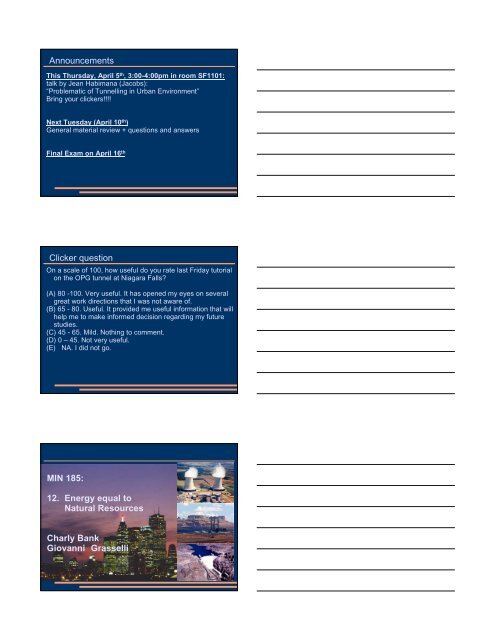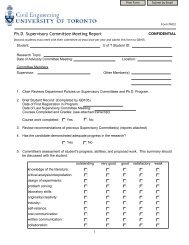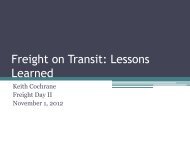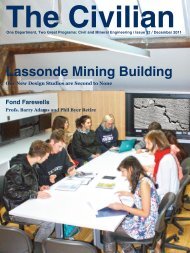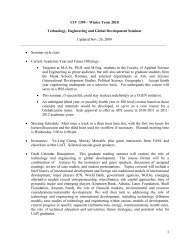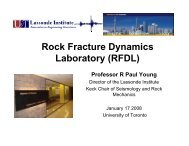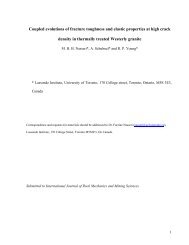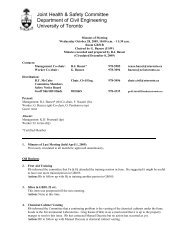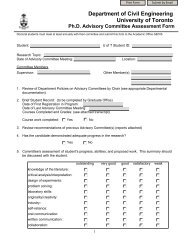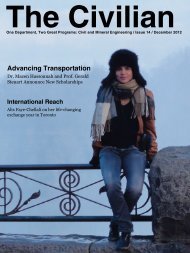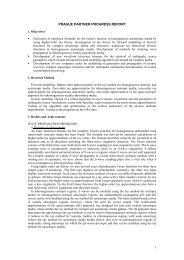Announcements Clicker question MIN 185: 12 ... - Civil Engineering
Announcements Clicker question MIN 185: 12 ... - Civil Engineering
Announcements Clicker question MIN 185: 12 ... - Civil Engineering
Create successful ePaper yourself
Turn your PDF publications into a flip-book with our unique Google optimized e-Paper software.
<strong>Announcements</strong><br />
This Thursday, April 5 th , 3:00-4:00pm in room SF1101:<br />
talk by Jean Habimana (Jacobs):<br />
“Problematic of Tunnelling in Urban Environment”<br />
Bring your clickers!!!!<br />
Next Tuesday (April 10 th )<br />
General material review + <strong>question</strong>s and answers<br />
Final Exam on April 16 th<br />
<strong>Clicker</strong> <strong>question</strong><br />
On a scale of 100, how useful do you rate last Friday tutorial<br />
on the OPG tunnel at Niagara Falls?<br />
(A) 80 -100. Very useful. It has opened my eyes on several<br />
great work directions that I was not aware of.<br />
(B) 65 - 80. Useful. It provided me useful information that will<br />
help me to make informed decision regarding my future<br />
studies.<br />
(C) 45 - 65. Mild. Nothing to comment.<br />
(D) 0 – 45. Not very useful.<br />
(E) NA. I did not go.<br />
<strong>MIN</strong> <strong>185</strong>:<br />
<strong>12</strong>. Energy equal to<br />
Natural Resources<br />
Charly Bank<br />
Giovanni Grasselli
1.<br />
clicker <strong>question</strong>:<br />
The energy needed to heat one liter of water from<br />
freezing point (0 degrees Celsius) to boiling point (100<br />
degrees Celsius) is comparable to the energy<br />
(A) needed to lift a 1 kg mass by 1 m.<br />
(B) used when taking the stairs to the fifth floor.<br />
(C) required to stay awake in class.<br />
(D) in an adult person's daily diet (2000 calories).<br />
1. conventional power stations<br />
principle of a dynamo<br />
- magnet rotated in coils<br />
produces AC current<br />
aside:<br />
- can be used as engine<br />
or break (electric trains,<br />
hybrid cars)<br />
- electric engines have<br />
immediate torque<br />
1. Surface water = Rivers = Energy
1. Hydroelectric power stations<br />
hydroelectric dam<br />
- power depends on elevation difference & flow<br />
- often used for peak demand<br />
- Sir Adam Beck: 1,400 MW; smallest in Ontario 1 MW<br />
(video 10’49”)<br />
1. Coal = Mines = Energy<br />
1. Thermoelectric power stations<br />
Coal plant with steam turbines<br />
- water cycled through heating and cooling<br />
- expanding steam (pressure >100 kg/cm2) drives turbines<br />
- efficiency ~45%<br />
- 5 Ontario plants:<br />
8,600 MW<br />
problems:<br />
- CO2 emissions<br />
- steam needs to<br />
be condensed<br />
(cooling tower,<br />
river)
1. Oil & gas = Underground reservoirs = Energy<br />
1. Thermoelectric power stations<br />
combustion turbines<br />
- usually run on natural gas, also oil<br />
- like a jet engine<br />
- can be started quickly for peak demand<br />
1. Uranium = Mines = Energy<br />
McClean Lake
1. Nuclear power stations<br />
nuclear power plant<br />
- steam turbines<br />
- 1/3 of Ontario's electriciy<br />
- baseball-sized bundles of 25 kg<br />
- 100,000 bundles used per year<br />
in Ontario's 3 plants<br />
- no CO2 emissions<br />
problems:<br />
- steam needs to<br />
be condensed<br />
(cooling tower,<br />
river)<br />
- radioactive waste<br />
- nuclear proliferation<br />
1. Nuclear power stations<br />
http://video.google.ca/videoplay?docid=3794377094345515334&q=nuclear+waste+management<br />
video length 8’07”<br />
1. What power station is best for our needs?<br />
Energy<br />
- base demand<br />
around-the-clock operation<br />
cost efficient<br />
mainly nuclear, coal, and running water<br />
- additional demand<br />
more flexible, cheaper to build, but not so cheap to run<br />
often coal, and oil<br />
- peak demand<br />
very flexible (quick on/off)<br />
cheap operating costs<br />
mainly gas engine, and hydroelectric power stations
1.<br />
electric grid<br />
1.<br />
clicker <strong>question</strong>:<br />
Why is overland transmission of electricity done using high<br />
voltage?<br />
(A) to allow for high current<br />
(B) to keep the current low<br />
(C) it is more dangerous<br />
(D) it looses more energy<br />
2. alternative energy<br />
biofuel, eg wheat pellets<br />
garbage combustion<br />
problems:<br />
- CO2 emissions
2. alternative energy<br />
wind energy<br />
eg, turbine at Exhibition Place<br />
- 94 m (30 storeys) tall,<br />
blades 29 m long<br />
- spins ~21 times /minute<br />
- 750 kW<br />
- owned by Toronto Hydro Energy<br />
Services and WindShare co-op<br />
- up to 1,000 MWhrs per year<br />
(250 homes, displaces 272 tonnes<br />
of carbon)<br />
2. alternative energy<br />
geothermal energy<br />
- steam or hot water from Earth<br />
- often not converted to electricity<br />
- cycling of water also possible<br />
- extensively used in Iceland (->),<br />
Philippines,... (volcanic areas)<br />
in Canada:<br />
- geothermal project at<br />
Meager Mountain, BC<br />
(100 MW facility possible)<br />
aside:<br />
heat-exchange pumps<br />
cooling using Lake Ontario<br />
2. alternative energy<br />
tidal power<br />
(a) kinetic energy (water flowing in<br />
channels)<br />
(b) potential energy (height difference)<br />
can have 80% efficiency<br />
in Canada:<br />
- Annapolis Royal Generating Station<br />
(NS, 18 MW)<br />
- Bay of Fundi (tides > 10 m) being<br />
– other stations considered here<br />
(>5,000 MW)
2. alternative energy<br />
solar power<br />
- array of mirrors heats a fluid which<br />
passes through a heat exchanger,<br />
steam then drives turbine<br />
- or solar towers (heat liquid sodium)<br />
- Solar Energy Generating System<br />
(350 MW, California)<br />
also for home use<br />
- solar panels produce DC current<br />
- requires batteries (maybe inverter)<br />
2. And the future? Is it sustainable?


